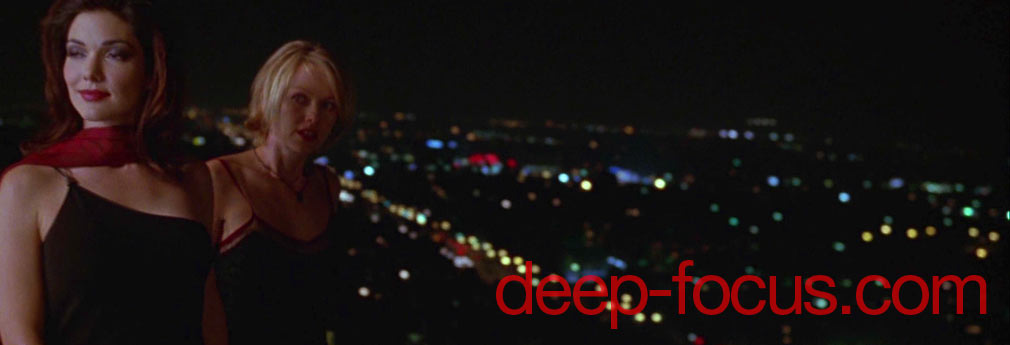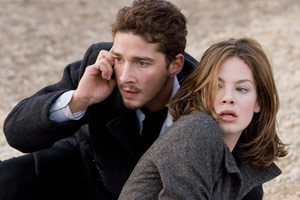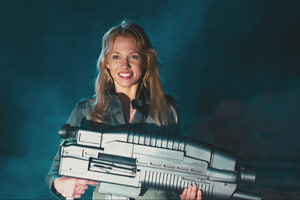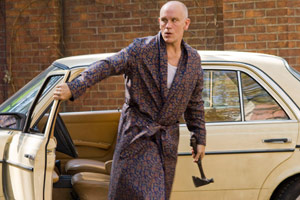Recently in DVD Category

Chicago 10, a documentary about the protests at the 1968 Democratic National Convention in Chicago and subsequent jury trial of eight protester defendants, is a bracing combination of archival footage and contemporary animation. The archival sections speak for themselves -- the colorful footage of groovy, loose-lipped protesters with a flair for the theatrics filling Lincoln Park is not only historic, but can be interestingly contrasted against the less colorful demonstrations of today -- but the interspersed animated sequences are something unusual. Working from stranger-than-fiction transcripts of the (sadly unphotographed) courtroom proceedings, writer/director Brett Morgan has assembled an all-star cast of character actors (Hank Azaria, Dylan Baker, Nick Nolte, etc.) to portray that world-class cast of characters (including Abbie Hoffman and Black Panther Bobby Seale), animated in a rotoscoped style reminiscent of Waking Life and A Scanner Darkly.
This loosely autobiographical quasi-coming-of-age tale from Garth Jennings, half of music-video production team Hammer & Tongs and the director of the unwieldy but fitfully amusing Hitch-hiker's Guide to the Galaxy feature, is crammed tight with every kid-pic cliché you can imagine. It starts with the unlikely friendship of imaginative loner Will Proudfoot (Bill Milner) and village tough Lee Carter (Will Poulter), then quickly becomes one of those movies about the making of a bad movie -- the titular "Son of Rambow," which is inspired by a bootleg videotape of First Blood shot by Lee at the local cinema. While Will has been raised in a straight-laced religious sect that forbids TV and movies, Lee is almost his polar opposite - a rambunctious (though soft-hearted) bully given to petty larceny who nonetheless wields a primitive VHS camcorder in the hope of winning a filmmaking contest by leveraging the limited materials available to him.

Director Enzo G. Castellari's 1978 World War II adventure is probably most notable for inspiring a new Quentin Tarantino screenplay. Its three-disc DVD release, from Severin Cinema, is a surprisingly deluxe affair tied to the Tarantino remake, with Q.T. himself showing up to interview Castellari and put the film in some perspective (it was never released theatrically in the U.S., so Tarantino discovered it on a TV screening). Some extensive making-of features and a CD of soundtrack music (the third disc) round out the package.

When I settled in to take a look at Nimrod Nation, an eight-part documentary series that aired beginning in 2007 on the Sundance Channel, I expected to sit still for an episode or two before deciding when and whether to continue. To my not-inconsiderable surprise, I devoured the first four episodes in a single afternoon, took down two more in the evening, and finished out the package the following morning. Taken as a whole, Nimrod Nation is not a great documentary, but it's a friendly and unassuming collection of days in the life that gets big points for compulsive watchability.
I haven't seen many Bollywood movies. It's quite possible that, were I more familiar with their form and conventions -- if the exotic-to-western-eyes spell they can cast were less of a novelty -- I'd have a lot less patience with Saawariya and the endless tiny complications that sustain its otherwise threadbare boy-chases-girl storyline over more than two hours of screen time. Then again, were I a Bollywood fanboy, I might be even more enchanted by everything that Saawariya gets right -- enough that I'd be less cognizant of what misses.
Dawn (Jess Weixler), the protagonist of writer/director Mitchell Lichtenstein's playfully gynephobic black comedy Teeth, is a high-school abstinence advocate whose no-sex-before-marriage stance masks her deep discomfort with her own body. Because Teeth is also a horror movie, the root of her fear is physical, not psychological -- as Anne Carlisle put it in the druggy downtown classic Liquid Sky, "this pussy has teeth."

The gimmick of this energetic Brit-com is that the action switches, approximately halfway through, from comic crime drama to comic splatter movie. The main problem, then, is that The Cottage, against the odds, makes a better caper movie than gore flick. The first half-hour or so is an engaging and amusing farce about kidnappers David (Andy Serkis) and Peter (Reece Shearsmith), who drive to a secluded house with their hostage, Tracey (Jennifer Ellison) bound and gagged in the trunk. It's not the best plan -- the outrageously busty Tracey may be the daughter of a gangster, but she's a terrible hostage, strong-willed and foul-mouthed. She knows David on sight. And their inside man, Tracey's brother Andrew, is a dimwit who brings the whole scheme tumbling down on top of them. About the time the car pulls up outside with a couple of Chinese hit men out for blood, The Cottage has established itself as a credibly tense comedy.

Image nicked from Tim Lucas's excellent Video Watchblog entry on Night of the Werewolf.
It's surely convenience, or just coincidence--rather than any nods to quality or pent-up demand--that these are the first two Euro-horror titles to arrive in high definition on Blu-ray Disc. This double-feature package from BCI and Deimos entertainment pairs two films starring the well-loved (and prolific) Spanish horror actor Paul Naschy. Vengeance of the Zombies (La Rebelion de las Muertas, 1972) is a potboiler from cult director Leon Klimovsky involving a charismatic Indian cult leader (Naschy), his less-attractive brother (also Naschy), and a beautiful redhead (Romy) from a cursed English family. And Night of the Werewolf (La Retorno del Hombre Lobo, 1980) is a genre mash-up directed by Naschy in which he stars as the wolfman Waldemar Daninsky and faces off against a bevy of vampire women led by Elizabeth Bathory herself. (Scroll way down to read about some problems with these discs.)



